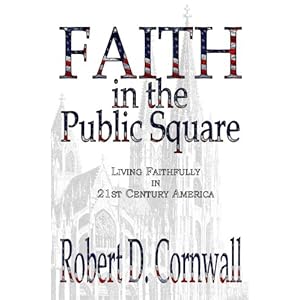New Book from Friend of Blog Bob Cornwall
Here is the press release for a new book from Bob Cornwall, a pastor in Michigan, blogger, and reader/friend of the blog.
In his foreword to Robert Cornwall's book Faith in the Public Square, Mark Toulouse responds to philosopher Richard Rorty’s claim that religion is a conversation stopper and thus must be kept private. Toulouse suggests that Rorty’s view of religion is distorted, though perhaps with good reason, because "he believes that religion can only speak in one way, the way that stops a conversation. But religion is far more complex and multifaceted than such a view would indicate. The damage religion can cause in public is when it enters in such a way as to claim sole ownership to the truth, and then seeks to legislate its view of the truth so that it affects the rights of others, whether at home or abroad." In Faith in the Public Square Cornwall attempts to provide a model of conversation that opens dialog rather than closes it.
So, can a person of faith be involved in the public square with integrity? Is public policy made better by this action? Can faith remain whole and genuine following the encounter? Read these essays to discover the answers, and perhaps find a new optimism for the future as you do.


Comments